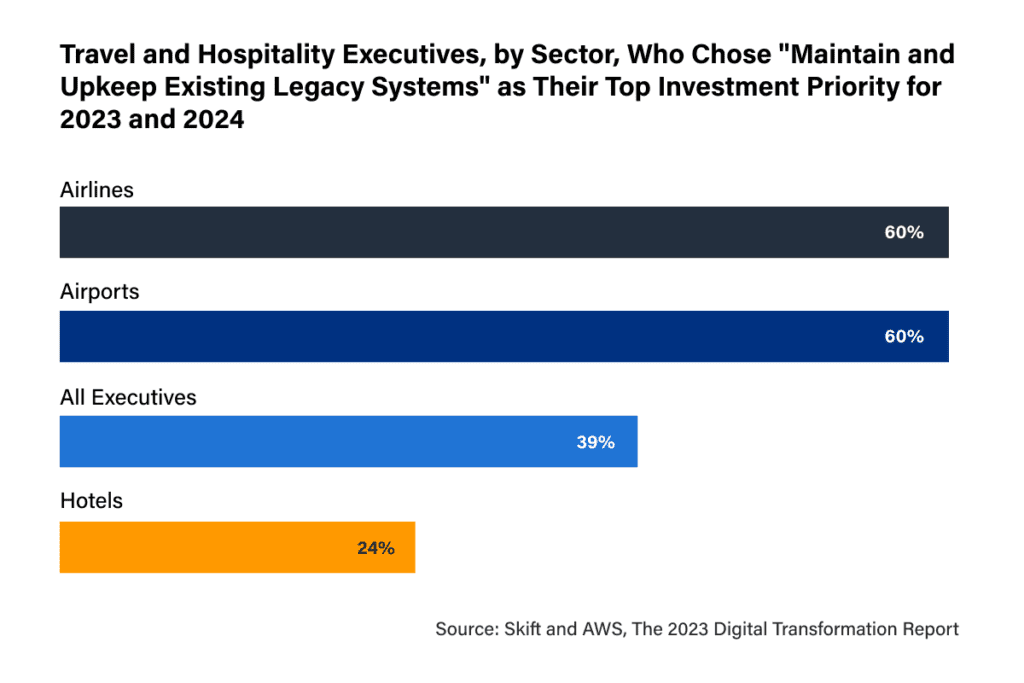Skift Take
Cloud technology is revolutionizing customer service in travel and hospitality. By passing routine requests through flexible, efficient, automated, and intelligent systems, companies give their human agents more space to handle complex issues with a delicate personal touch.
This sponsored content was created in collaboration with a Skift partner.
Driven by two years of major weather events, ongoing labor challenges, and overtaxed support systems, travel and hospitality leaders have recently elevated their focus on customer service. To do so, they are exploring cloud-based, digitized, centralized, and automated features that can more quickly and effectively support travelers.
According to the fourth-annual Digital Transformation in Travel and Hospitality survey conducted by Skift and Amazon Web Services (AWS), 66 percent of travel and hospitality executives said that customer service was a “high priority” among their digital and software investments for 2023, the No. 1 response.
Reflecting travel’s new reality, retaining and delighting customers with real-time solutions across all channels has become imperative to their survival and growth. This article explores how travel and hospitality companies can use cloud technology to leverage data and improve customer service in real time. By automating routine requests while empowering agents to handle more situations that deal with complex issues, they’re able to cut down on customer wait time and improve overall satisfaction.
For more insights on the state of digital, cloud, and AI adoption, innovation, and strategy in travel and hospitality, download The 2023 Digital Transformation Report from Skift and AWS.
Leaving Legacy Behind for Greater Flexibility and Efficiency
What does “improving customer service” look like in today’s travel environment? The number of digital touchpoints available, and the speed at which travelers expect a response through those channels, has accelerated significantly. The ability to reach customer service quickly — often to solve novel, unique, or complicated issues — has become an essential consideration for travelers when choosing brands and experiences.
“In travel and hospitality, the way you differentiate is really on service,” said Jonathan Barouch, CEO and founder of Local Measure, which operates a cloud-based contact center solution called Engage for Amazon Connect. “But I think many companies are better delivering on that brand promise in the four walls of their hotel or in the cabin than necessarily via the technology and through the contact center.”
If the mandate is clear, the implementation is more complicated — especially in a world where legacy systems still form the foundation of travel and hospitality technology. Barouch estimated that 90 percent of call centers still rely on outdated, on-premises systems.
As one client reported to him, prior to moving to a cloud-based system, a customer may have had to transfer at least two or three times before getting to the right person to solve an issue. A hotel group in Australia told him that they actually had no idea how many phone calls they missed on their reservation line. If the phone rang, they’d answer it, but if someone called while those agents were tied up, they wouldn’t have any data on who was potentially waiting.
These are not only frustrating customer experiences. Depending on the size of the business, they could possibly represent millions in lost bookings, labor costs, and telephony expenditures, not to mention untold value in customer loyalty and potential brand damage. Cloud technology can enhance the industry’s ability to provide personalized customer service, giving them what they want and creating operational efficiencies that make all the difference.
However, just 40 percent of executives “strongly” agreed that their customer service channels were well equipped to respond to rapid or significant shifts in demand, according to Skift and AWS research. Meanwhile, about 40 percent of executives also said that their companies’ No. 1 priority for technology system and infrastructure investments in 2023 and 2024 was to maintain and upkeep existing systems and processes. In the aviation sector — which has seen significant stress on its operational systems and customer service channels in the chaos of post-pandemic travel — that figure stood at nearly 60 percent.
With legacy, on-premises systems, it’s virtually impossible to scale up and down based on demand, leaving contact centers with no recourse in busy times. The cloud not only enables companies to track the volume of requests coming in, but also it allows them to scale up and down as needed — adding capacity when there’s down time and prioritizing and routing when there’s high volume so that the most pressing issues are addressed first, as well as using chatbots or generative AI to automate certain steps.
“The point is not whether or not cloud is cheaper,” said Sowmya Mullur Rajagopalan, head of travel, transportation, and hospitality, Americas, for Tata Consultancy Services. “If companies don’t modernize and continue with their legacy systems, they will have to pay a price for that.”
Empowering Personal Service, Not Replacing It
With the rise of automation and AI occurring concurrently with a continued labor shortage in the travel and hospitality industry, executives, industry workers, and travelers alike report being uneasy at times about whether a tech-first experience may remove the personal interaction — the key touchstone that makes travel so special.
The reality is that advanced technology can in fact enhance the human touch. Cloud-based service centers can handle the vast volumes of data required to take advantage of advancements in AI support in the future. Generative AI can be used to concisely summarize conversations to reduce the time agents and managers spend taking and reviewing notes or sharing context when transferring contacts.
For example, Accor has implemented conversational analytics with Amazon Connect Contact Lens, which serves as a personal assistant for agents. Analyzing conversations in real time, agents receive real-time recommendations based on what’s happening in the conversation in real time. Using Amazon Connect, Accor has achieved a 97 percent customer satisfaction rate.
There are also ways that complete automation of certain tasks improves the customer experience, especially in cases where a routine or standard response is required. There’s no reason someone should have to sit on hold for 40 minutes to change a flight or upgrade a seat.
Making these improvements to the customer experience wouldn’t be possible without the cloud. Overall, cloud technology helps move organizations from being static, siloed, and centralized to becoming more dynamic and distributed — like their customers already are.
“The risk is existential,” said Barouch. “The question is how can you leverage the technology to make the experience even better, to make the customers want to come back even more?”
For more insights on the power of cloud technology and AI for travel and hospitality companies, download The 2023 Digital Transformation Report.
This content was created collaboratively by AWS for Travel and Hospitality and Skift’s branded content studio, SkiftX.
Have a confidential tip for Skift? Get in touch
Tags: AWS, customer service, hospitality, SkiftX Showcase: Hospitality, the prompt, travel technology



